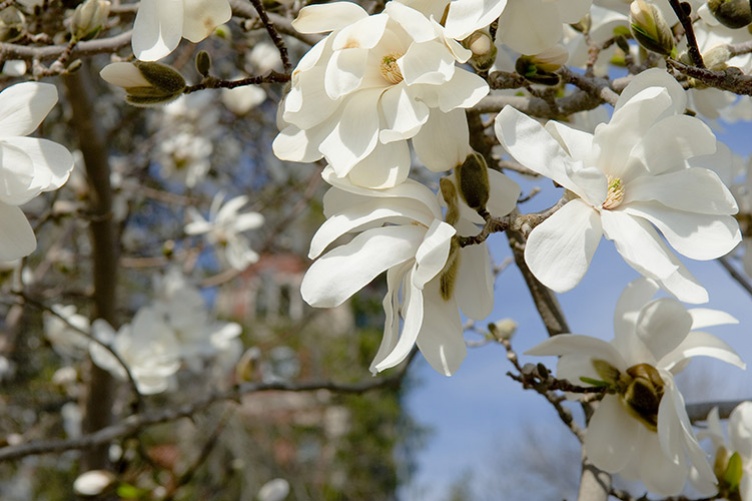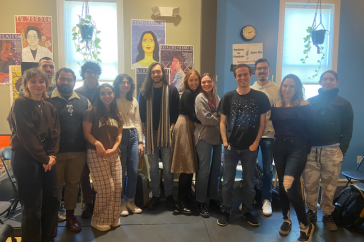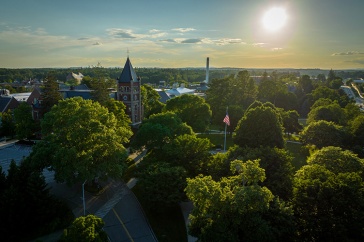
Sue Wheeler
Sue Wheeler, a lecturer in the English Department’s writing program for many years, passed away at the age of 83. She was a graduate of Wellesley College. In addition to teaching in the English Department, she taught at the Molasses Pond Summer Writer's Conference and the Dover Adult Learning Center of Strafford County; she also briefly worked for Public Television in Durham. Sue published short stories in The North American Review, Willow Springs, The Lyndon Review, The Bradford Review, and other literary magazines. She also co-authored, with Rebecca Rule, two important books on the craft of writing: "True Stories: Guides for Writing from Your Life" (Heinneman, 2000) and "Creating the Story: Guides for Writers." In her books, Sue, in a warm, wise and encouraging voice, describes the writing process, from the inkling of a subject, to drafts, to specific writing skills, to a final product.
...a master teacher of writing who always understood how to reach student writers and get them to produce their best work.
I can think of no better tribute to Sue than the one that my colleague Professor Christina Ortmeier-Hooper recently shared with the English Department faculty and staff. Christina writes: “Sue was one of the great lecturers in our 401 and 501 program. She was a master teacher of writing who always understood how to reach student writers and get them to produce their best work. She had an inspired, wicked sense of humor. Sue trained so many of our TAs, and her books with Rebecca Rule are still staples in the 501 classroom." Sue will be greatly missed by everyone in the Department of English.
Sue Wheeler passed away on February 24, 2020. She served UNH from 1978 to 2005.
—Rachel Trubowitz, chair and professor of English
Mel Bobick
Mel Bobick. What can one say about Mel Bobick? Well, according to his CV, he was born in 1926 and received his B.A., M.A., and Ph.D. at University of Illinois between 1949-1958. At this point, I would normally describe Mel Bobick’s prolific record of scholarly publication, but alas, no such record exists. Publishing was simply not Mel’s bag. Some might go so far as to say that he would sooner have perished than published. But as anybody who knew him will tell you: what he lacked in traditional scholarly output, he more than made up for with prolific dialogue, usually at a volume exceeding 11.
My own first memory of Mel Bobick involved running into him outside of his office on Horton’s fourth floor in 2002. I don’t recall him having attended my job talk the year prior, and that’s probably just as well. I could imagine him grumbling at my brand of quantitative sociology and bemoaning what my generation of young whippersnappers had done to his discipline. But bumping into him that day in Horton, almost literally, I think I may have introduced myself as the new guy, to which he replied, “Pleased to meet you! I’d like for you to be my guest at the opera later this week!”
He then proceeded to hand me a ticket that I’m not sure I accepted in the confusion of that moment. But I later came to learn that Mel absolutely loved the arts, was passionate about the things he loved, and, frankly, was passionate about most other things too.
Mel loved teaching and, in particular, loved teaching his signature course entitled arts and society. Still more, he loved introducing students to the arts. To quote one of his UNH colleagues, “Mel’s pedagogy was about getting students in the front few rows of whatever performance they were attending because he wanted them to see the physicality of the arts and of human expression.”
Mel also seemed to love walking to the proverbial beat of his own drum. Other sociologists often disputed whether what he was offering his sociology students was sociology at all. Heaven forbid, for example, you didn’t include any plato in your syllabus. “But Mel, it’s a course about quantitative research methods!” “I don’t care: MORE PLATO!” To quote another of his long-time colleagues, “It was good fodder for debate – even if those debates were often one-sided affairs.”
Mel fundamentally changed the way that innumerable students viewed the world.
If I’m to believe an article I recently read entitled “Why it pays to be grumpy and bad-tempered”, plato’s student, Aristotle, was a firm believer in catharsis and invented the modern meaning of the word. Two thousand plus years later, Mel’s default setting was a catharsis the likes of which Aristotle may never have imagined. According to one of his former students, Mel once became so passionate while talking about Greek art that tears began rolling down his face and, with that, he unknowingly impressed upon that student, for the first time in that student’s life, that art was worth crying for.
Ultimately, in digging through the ancient scrolls of McConnell’s basement to research Mel Bobick’s career, and likewise in soliciting old stories from those at UNH who knew him, it became clear that Mel fundamentally changed the way that innumerable students viewed the world. In that respect, his scholarly influence on the UNH community, was not only prolific, but also profound.
Farewell, Mel. You were truly one of a kind.
Mel Bobick passed away on March 1, 2020. He served UNH from 1958 to 2005.
—Cesar Rebellon, chair and associate professor of sociology
Allen Linden
Allen Linden joined the UNH History Department in 1963, and he was already a shrewd negotiator. I’m sworn to secrecy about the exact amount, but let’s just say that Al apparently negotiated a 6% pay raise before he set foot in Durham. Perhaps he had to be tough, since he had served in the army in Korea, gotten his Ph.D. in Asian history from Columbia University and resisted pressure from the Manchester Union-Leader, which objected to his advocacy of recognizing the Peoples Republic of China and treated him as if he had served in the North Korean Army.
...a warm, talented and generous teacher, who had time for every student and even soaked-behind-the ears new faculty members...
Al retired in 1995, so I overlapped with him for just one year. Yet I share memories with my other senior colleagues of a warm, talented and generous teacher, who had time for every student and even soaked-behind-the ears new faculty members like me. Lu Yan, our current historian of China, noted that from the time she arrived she was always welcome to just drop in unannounced to the Lindens’ house on Hoitt Avenue in the faculty neighborhood. Al had a legendary love of puns, so that when someone asked where he lived, he would say “It Hoitts me to say.” In 1995, as we were co-teaching IA 501, I asked him what a certain situation might be in 25 years and he instantly said, “it will be the year of perfect vision.” And here we are in 2020 remembering him. I should note the department’s prize for the best senior thesis is the Linden Prize.
Al Linden, master teacher, passed away on April 16th of complications from two of the scourges of the 21st century, COVID-19 and dementia. He is survived by his wife, Adina, and two children and their families.
Allen Linden served UNH from 1963-1995.
—Kurk Dorsey, chair and professor of history
Yutaka Yamamoto

Yutaka Yamamoto was a unique individual with a unique history. He was born in California, where his parents were chicken farmers. After Pearl Harbor, 1941, when Yutaka was 6 years old, his father was arrested for being a community leader, placed in a POW center and separated from the rest of the family, who were in turn placed in internment camps, three camps over five years, eventually settling in the Crystal City, Texas, internment camp where the family was reunited. They were set free in 1946. After graduating high school in Petaluma, California, Yutaka attended University of California, Berkeley, where he received a B.S. in 1957 in structural (aeronautical) engineering, later working for a few years as an engineer (1957-58 and 1960-62) with a design team for bridges in the San Francisco Bay area. He tells a story where he was working on the San Mateo-Hayward bridge in South San Francisco Bay and rescued a man from the water: the distraught man had jumped from a lower part of the bridge, not realizing that the water was very shallow and so he wound up stuck two feet deep in mud just below the water. Thirty or so years later, after one of the San Francisco earthquakes, he was called by a reporter about one of the bridges/viaducts he helped design. From 1958-1960, he served as a first lieutenant in counter-intelligence for the army, apparently gathering intelligence in NYC on possible infiltration of Soviet spies among refugees from a Soviet satellite country. At some point, Yutaka was reading about dreams and saw a reference to Plato, pursued it, and he was hooked on philosophy, much to his father’s chagrin.
...he was a popular teacher beloved by students, one of the “cool professors” as they were wont to put it.
Yutaka arrived at the UNH Philosophy Department in 1973. He served as department chair spanning the years 1979-1994. Before coming to UNH, he taught philosophy at Purdue University from 1968-1973 while completing his Ph.D. Yutaka received his Ph.D. in philosophy from the University of Michigan with a well-received dissertation on the problem of justification for contractualist ethical theories, with Richard Brandt and William Frankena, two luminaries in ethical theory, as his main committee members. His Ph.D. was preceded by an M.A. in a law and philosophy program jointly sponsored by the University of Michigan Philosophy Department and the University of Michigan School of Law.
Yutaka’s primary interests were in ethical theory and philosophy of law with additional interests in Buddhist philosophy, action theory, modern philosophy, epistemology and logic. He taught a wide variety of courses at UNH, and he was a popular teacher beloved by students, one of the “cool professors” as they were wont to put it.
Yutaka was a very dedicated chair of our department, spanning 14 years of service, from 1979 to 1994, and thus, unusually, he began chairing near the beginning of his post-Ph.D. career. He had a very calm, easy going and cheerful manner, something we benefited from especially in his capacity as chair, but also as a colleague and friend. One of our prior long-standing administrative assistants told a story emphasizing his equanimity. He was on the way to the airport and realized he needed to do something in the office before his flight. He parked near an administrative building, presumably in the wrong spot, and his car was towed. She reported that it was the only time she had ever seen him angry.
Yutaka was also a contributor to the university and the state, especially in multicultural activities, serving as chair of the Advisory Board of the UNH Office of Multicultural Affairs, a member of the committee developing the race, culture and power minor, the UNH Committee on Diversity, the East-Asian Studies Board, and the Japan Faculty and Student Exchange Committee. He also served on the State of NH Advisory Committee to the United States Commission on Civil Rights. He was a founding member of the Board of Directors, Japan-America Society of New Hampshire, serving for 6 years. He also played a role in the early preliminary study for the development of a center for the humanities, later co-chairing the UNH Task Force on the UNH Center for the Humanities, and subsequently serving on the search committee for our first Humanities Center director.
Yutaka was a very sociable human being and his house was opened to us, as well as to other community members. For a number of summers in the 1990s, he also hosted Japanese students who would come to UNH to study English for a few weeks. Throughout his time with us, he hosted numerous wonderful parties, a few department parties each year, as well as hosting smaller parties for departmental speakers and colleagues. Students were always welcome at the department parties, and they came in large numbers. At department parties, at his initiative, he and others would sing Karaoke or just sing along, while still others played on his Pachinko machine, or engaged in a game of chess or just chatted. As the night wore on, he would always come out with a tray carrying a wide variety of sake cups, filled of course. Everyone loved his parties and coming to his house. There is a story about people on the west coast at a philosophy department party (at UCLA I believe). A few of the people sitting around were remarking on how great a philosophy department party this was when one of those began saying, “There is only one other philosophy department party I’ve been to of this caliber …”, and two others in the room leaned forward enthusiastically finishing the sentence: “Yutaka Yamamoto’s!”
Yutaka loved to gamble. He regularly spent time in summers in Las Vegas, playing black jack and poker. In Dover, he often hosted a Friday night poker game at his house with local aficionados. Paul McNamara, who thought of Yutaka as his best friend, reports that he would usually take a beating on those Friday nights, but it was well worth anteing up. Yutaka followed sports closely, often hosting small parties at his house watching various playoffs and championship games, and he was known to place the occasional bet on the games. He also enjoyed teaching probability theory in elementary logic courses and once taught a somewhat controversial continuing education course on gambling (probability and strategy). Apparently, one student came back to thank him after winning big in Vegas.
Yutaka, quintessentially social, loved to talk philosophy, and he did so far and wide. He was a visiting faculty member at UCLA; at California State University, Fullerton; University of Idaho; University of Rhode Island; University of Nebraska; University of Arizona; University of Hawaii at Minoa; Kobe National University; Osaka National University; and, while on leave from UNH for two years, he was a visiting professor at Kobe Shoin Women’s University. He also presented a paper in Seoul Korea on filial piety. After his 1997 retirement from UNH, he settled in Kobe Japan, where, until 2007, he was a faculty member at Kobe Shoin Women’s University in the Department of English Language and Literature. He also mentored one of our alums in Japan, Cory McKenzie, who is now pursuing his Ph.D. in Japanese medieval literature.
There is an element of coming full circle here, as while in NYC in 1959-60, he enrolled in Columbia University’s Creative Writing Program, and he left us with two unpublished screenplays that he worked on a great deal after his retirement from UNH, both about the internment of Japanese Americans. He enjoyed those retirement years very much, he and his wife, Akiko, having made many friends in Kobe. However, with declining health, especially last winter and spring, he died from a second bout of pneumonia, with his loving wife Akiko at his side.
Among Yutaka’s many endearing characteristics, in addition to his striking uniqueness, was his sheer exuberance for life. He made a point of really enjoying it. Both of these indelible traits are on ample exhibit at his wedding to Aki in Las Vegas.
Yutaka Yamamoto passed away on April 16, 2020. He served UNH from 1973 to 1997.
—Paul McNamara, associate professor of philosophy
-
Compiled By:
Susan Dumais '88 '02G | College of Liberal Arts



















































